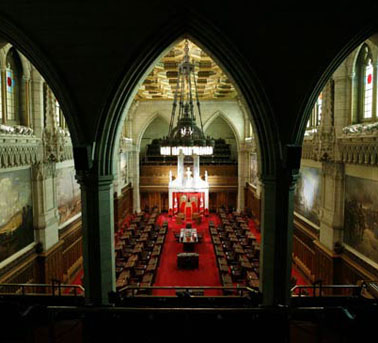PM Harper : Senate reform “much slower than I’d hoped, but … we’ll continue to push it forward”
Jul 20th, 2012 | By Randall White | Category: In Brief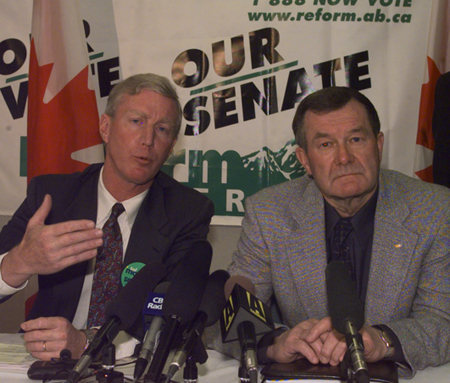
Those were the days : Ted Morton (left) and Bert Brown (right) talk about Senate reform in Calgary in 1988. Shannon Oatway / Postmedia News.
Somehow it seems right to be thinking about Senate reform in Canada in the dead of summer. Like almost everything else this time of year in the true north strong and free, it seems quite agreeable (to some of us at any rate) but not entirely serious. (It will not last, etc, etc.)
What is now known as Bill C-7 – “An Act respecting the selection of senators and amending the Constitution Act, 1867 in respect of Senate term limits … Short Title … Senate Reform Act” – still strikes me as one of the few quite admirable things the Harper Government has tried to do. You might think as well that ever since the election of the present Harper Majority Government last spring (albeit with less than 40% of the Canada-wide popular vote etc), Mr. Harper’s long meditated plans for at least starting a pioneering process of step-by-step Senate reform in Canada would at last go sailing through Parliament.
Even with a majority government, however, this remains a complicated country. Mr. Harper now has a majority not just in the elected Canadian House of Commons, but in the unreformed Senate of Canada itself. Yet the first reading on Bill C-7 in the House came as long ago as June 21, 2011. The last full debate on second reading took place as long ago as February 27, 2012.
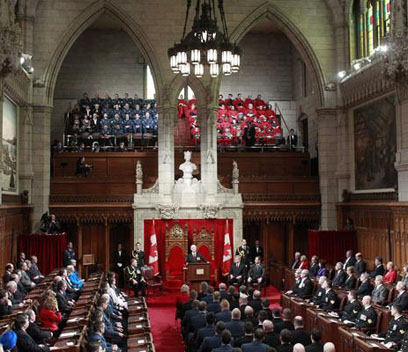
The fabled Red Chamber in Ottawa, in action. Well it is at least hard to pinpoint the Senators who are sound asleep in this photo, from REUTERS/Dave Chan.
There seems to have been a failed attempt to move the second reading debate in the House a little further along early this past month of June. And at this point the sometimes forward-looking Senator Hugh Segal, from Kingston, Ontario, proposed that the Senate start considering Bill C-7 even before the Canadian House of Commons passed the thing. But this has just once again drawn attention to the laughing-to-keep-from-crying prospect that the unreformed Senate, which Mr. Harper has lately packed with partisans allegedly committed to his reform plans, actually has substantial numbers of Conservatives who oppose Bill C-7!
Moreover, of course again, these recalcitrant Tory Senators (sometimes claimed to not really exist by some rigorous Harperites, Harperarians etc) are not alone. Back in January of this year the Canadian Bar Association expressed some concerns about the constitutionality of Bill C-7, and recommended that the Harper government send it to the Supreme Court of Canada for an opinion, or get provincial approval under the Constitution Act 1982 amending formula.

Pamela Wallin ... one of Stephen Harper’s many recent Senate appointments. Aaron Harris/Canadian Press.
Then, on May 1, 2012, “Quebec Justice Minister Jean-Marc Fournier announced … that the province has asked the Quebec Court of Appeal … to declare unconstitutional Bill C-7, a proposal by the Harper government that calls for the election of senators.” Less than two weeks later, “Roger Gibbins, who steps down later this month as president and CEO of the Canada West Foundation,” joined “Saskatchewan Premier Brad Wall and former Stephen Harper campaign strategist Tom Flanagan among influential westerners who’ve come to the conclusion Senate reform – as currently envisioned – is either unnecessary or misguided.”
Happily enough, and in keeping with the sunny summer season, PM Harper himself is apparently still chasing after the holy grail. In his almost notorious Saturday night barn-burning speech in the capital city of the Calgary Stampede on July 7 he was still urging : “And, by the way, we have not given up on our goal of reforming the Senate. We said we would give the provinces the opportunity to elect Senators. Now, for the first time ever, we have two elected Senators in the Upper House. And, thanks to the recent elections here in Alberta, and some good prospects elsewhere, the ranks of elected Senators will continue to grow!”

Tim Uppal, Minister of State (Democratic Reform) introduced the current Senate Reform Act (Bill C-7) in the Canadian House of Commons, on Tuesday, June 21, 2011.
Just a few days before Mr. Harper had also told a Calgary radio interviewer who had asked about Senate reform: “Well, we’ve, you know, we’ve had legislation now before Parliament since we were first elected in 2006 to make some incremental constitutional change to the constitution. There are things the federal government can do acting alone. As you know, we’ve tried to limit the terms of senators. Presently they can serve up to 45 years without having been elected in the first place. We also have… we’ve tried to enshrine in legislation our provision to appoint elected senators. As you say, Alberta’s done it. We have some more elected senators to appoint. We actually have two elected senators sitting in the Senate now, first time in history we’re up to that number. New Brunswick is, I think, pretty committed to having elections at some point in the future. British Columbia is toying with it. So you know, look, this has been much slower than I’d hoped, but we’ll continue to… we’ll continue to push it forward.”
The ongoing need to abandon provincial equality in the “Triple E” model
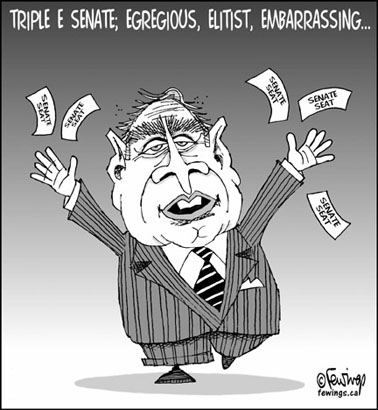 I hope myself that Mr. Harper does continue to push forward with the start of his step by step Senate reform plans in the current Bill C-7. We need a democratically elected Senate in Canada that effectively represents regional interests in federal government institutions, at long last.
I hope myself that Mr. Harper does continue to push forward with the start of his step by step Senate reform plans in the current Bill C-7. We need a democratically elected Senate in Canada that effectively represents regional interests in federal government institutions, at long last.
At the same time, if there is one thing the modern Canadian Senate reform debate has made very clear (it also seems to me at any rate), it is that the principle of equal provincial representation in the so-called “Triple E” model that arose in Alberta back at the beginning – and that is also reflected in the elected Senates which already exist in the federations of the United States and Australia – is just not suited to Canadian realities.
Equal provincial representation in a reformed Senate of Canada flies in the face of the longstanding role of Quebec in Canadian federalism – and especially of the constructive Canadian House of Commons’ near-unanimous recognition that the Quebecois constitute a nation in a United Canada, late in November 2006. It ignores the unique combination of a few very big and a few very small provinces in the Canadian federation. And even or especially from the standpoint of the two most westerly rising provinces of Alberta and BC, it ignores the thorny fact that in a provincially equal Senate in Canada the six demographically smallest provinces, accounting for less than 15% of the Canada-wide population, would constitute a majority – that just might, eg, be recurrently or even perpetually interested in large “equalization” or federal transfer payments from the most prosperous larger provinces.
The Harper government’s current answer to the increasingly recognized problems of equal provincial representation in the original Alberta “Triple E” model just seems to be that this Senate reform issue is not being dealt with in the early step by step plans of Bill C-7. This issue will be looked at further down the road. Bill C-7 only deals with Senatorial term limits and elections. And that is enough to get the ball rolling.
The trouble is that the unresolved question of a new provincial representation formula for a reformed Canadian Senate is still out there dangling. And, it seems to me at least, once again, this dangling is a key ingredient in the current drag on the step by step reform process. It lies at the bottom, eg, of the Quebec government’s appeal of Bill C-7 to the Quebec Court of Appeal, on the one hand, and, on the other, of the new Western Canadian disenchantment expressed by the likes of Roger Gibbins and Tom Flanagan (or in such very recent headlines as “Jesse Kline: The West got in; is Senate reform still relevant?”).
 There are alternative models of provincial representation. And I, along with others on this site, have discussed some of them – as we all laugh to keep from crying, all the way to some very obscure small bank, somewhere close to the magnetic North Pole! See, eg: “Bribe Prince Edward Islanders to reform the Senate, not kill it” ; “A reformed Senate in a Canadian republic .. manifest destinies or impossible dreams?” ; “Whatever happens with Senate reform in Canada, Washington is no model” ; “2010: the year Stephen Harper finally got his majority .. in the unreformed Senate of Canada!” ; “NDP (and Liberals) could support Harper’s Bill S-8 on Senate elections, in exchange for provincial representation concept that makes sense for Quebec” [S-8 being an earlier ancestor of the present C-7] ; “What if Canadian Senate reform also became a way of recognizing Québécois nation in a united Canada?”
There are alternative models of provincial representation. And I, along with others on this site, have discussed some of them – as we all laugh to keep from crying, all the way to some very obscure small bank, somewhere close to the magnetic North Pole! See, eg: “Bribe Prince Edward Islanders to reform the Senate, not kill it” ; “A reformed Senate in a Canadian republic .. manifest destinies or impossible dreams?” ; “Whatever happens with Senate reform in Canada, Washington is no model” ; “2010: the year Stephen Harper finally got his majority .. in the unreformed Senate of Canada!” ; “NDP (and Liberals) could support Harper’s Bill S-8 on Senate elections, in exchange for provincial representation concept that makes sense for Quebec” [S-8 being an earlier ancestor of the present C-7] ; “What if Canadian Senate reform also became a way of recognizing Québécois nation in a united Canada?”
The retiring Quebec Conservative Senator David Angus has urged that his party could win more seats in his province, if only Quebecers felt Mr. Harper was part of “their flesh and blood,” if only he and his party could “ get the minds and the people … Quebecers by definition – and this is a theory I really believe in – are small-c Conservatives.” (And for proof of this, one might say, consider the long reign of Maurice Duplessis, who gave his people the present-day Quebec flag, and who engineered the amazing triumph of John Diefenbaker in la belle province in 1958.) To take just one case in point, coming out for a provincial representation concept in a reformed Senate that makes sense for Quebec, and that is also a way of recognizing the Québécois nation in a united Canada, could be just what the doctor ordered for the Harper Conservatives in Quebec.
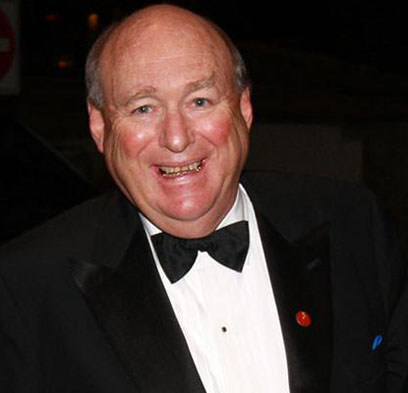
Retiring Conservative Senator from Quebec, David Angus. Photograph by: John Major, The Ottawa Citizen.
Yet it is of course daydreaming in technicolour to imagine that anything remotely like this is actually going to happen. After more than six years now, Stephen Harper has shown that, whatever else, he is just not that imaginative, or courageous, or bold (or even just what the legendary Bill Davis in Ontario used to call “creative”). It now seems that those of us who still do believe in Mr. Harper’s step by step Senate reform concept – as a constructive beginning to a more extended reform process a bit further down the road – will be lucky to see the present Bill C-7 passed at last by the Conservative majorities in the House and the Senate, before the next federal election in 2015. Still, assuming something like this at least does actually happen, I do think it could finally prove to be one of Stephen Harper’s few real legacies of consequence to the Canadian people, from coast to coast to coast. And as an at last somewhat cooler evening settles so benignly over the rooftops, here at the urbane edge of the wilderness, that does seem the coolest note on which to end.
